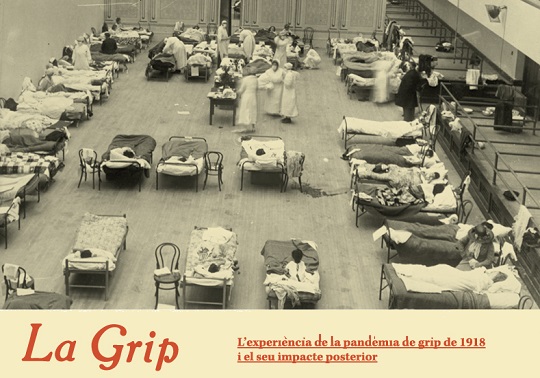
The experience of the 1918 influenza pandemic and its subsequent impact.
From December 11th 2019 to March 13th 2020.
Palau de Cerveró. José Puche Room
From Monday to Friday from 9 a.m. to 8 p.m..
Closed on weekends and holidays
Guided visits: 96 386 49 22; visites.guiades@uv.es
The 1918-19 influenza pandemic has been, until the emergence of AIDS, the most important epidemic crisis of the 20th century, recently described as the genetic mother of all influenza pandemics (Taubenberger, Jeffery K.; Morens, David M. “1918 Influenza: the mother of all pandemics”, Emerging Infectious Diseases, 2006, 12(1):15-22). This severe health crisis, responsible for an estimated 50 to 100 million deaths today, infected more than a third of the world's population and had a case fatality rate of more than 2.5%, well above the 0.1% rates of other influenza pandemics. It was a traumatic experience that generated a great social commotion and the fear that a disaster of similar dimensions could be repeated, changing the perception of the risk regarding influenza. In spite of the past century and the studies carried out to try to unravel the secrets of this serious health crisis, the magnitude reached and the greater mortality caused among the young adult population remains an unknown.
This pandemic has gone down in history as the "Spanish flu", although this description, given by the European press, does not reflect its true origin, but was the result of the circumstances that surrounded it. Its coincidence with the end of the First World War and the existing military censorship in the countries that participated in that war made it easier for it to be silenced when it appeared in them two months before the start of the epidemic in Madrid, coinciding with the days prior to the Saint Isidore festivities on 15th May.
This exhibition aims to show the population the most important aspects of what happened in that biennium (context, origin, diffusion, demographic, scientific, social and economic impact), as well as the responses offered by the different sectors of society (medical, health authorities, government, general population, general information press); to highlight the impact that the experience of this health crisis had in subsequent years and the lessons that can be learned from it, as well as to highlight the role that historical-medical reflection on past health experiences can have in finding keys to address current public health problems and not only that of the flu itself, which continues to be a problem today, as revealed by the significant number of annual sick leave for this cause and the deaths it produces and could be avoided.
Curators:
María Isabel Porras Gallo
María José Báguena Cervellera (IILP-UV)
- From 11 december 2019 to 11 march 2020. Wednesday at 19:00 to 20:00.
- From 12 december 2019 to 13 march 2020. Monday, tuesday, wednesday, thursday and friday at 09:00 to 20:00.
Sala José Puche. Palau de Cerveró
Instituto Interuniversitario López Piñero (Universitat Miguel Hernández, Universitat Jaume I y Universitat de València)
Grupo de investigación Salud, Historia y Sociedad (SALHISOC)
Facultad de Medicina de Ciudad Real. Universidad de Castilla la Mancha, Vicerrectorado de Cultura y Deporte de la Universitat de València.
Contact mrile@uv.es




